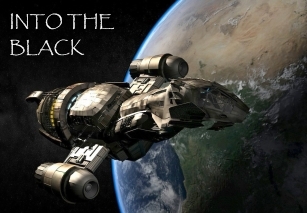
BackgroundIndex | Into The Black? | The Game | Background On the edge of known space in the Spinward Marches of the Far Galactic Arm, a super-massive black hole not centered upon a galaxy had been discovered during the time of the second republic. It was long thought impassable because of the large ergo sphere that gravitational lensing marked as an inescapable route to the event horizon of the black hole. Long had this marked the edge of human expansion in the marches, and its very existence made trade routes longer than need be because of the effects of the gravitational forces emanating from the black hole. Matt Visser, a Thean physicist theorized that previous studies had been wrong, and was willing to risk his life on the venture, supposing that a controlled burn around the horizon of the ergosphere would not carry you into the event horizon, but would actually result in a shorter route to the would prove to be not only possible, but a more profitable space route to the near side of the galaxy. Going to Theah's office of exploration, Visser was unable to get a charter as a Rogue Trader, so he petitioned the Castillians. As the hostilities between the two countries were reaching a point of spirited rivalry, the king sponsored Visser out of spite more than anything else, not expecting a return on his investment other than to be able to point out that Castillians were more ready to sponsor science and exploration than their rivals. It happened that Visser's theories were incorrect, but in the infinite ironies of exploration, stumbled upon a greater discovery. They were unable to escape the ergosphere of the black hole, but its mass hid on the other side of its even horizon an inexplicable Einstein-Rosen bridge, or a wormhole. Out of all calculations and theorizations, it was merest luck that brought them to the most exciting find in uncounted years, traversing not just to the other side of the galaxy, but to an unknown galaxy. The first solar system that was colonized had apparently been terraformed by an unknown civilization, called the precursors. Much of their technology had been left behind on the planets, and this helped the expedition in the days to come. As many of those who came across in this first expedition were scientists who were of a similar mindset as Visser, the new nation that was created in this new solar system was based around a scientific-centric social structure, with freedom unknown in any of the nations that were left behind. It was several years before Visser felt confident enough to send back a message to his sponsors, as much because they had not the resources to spare as because the council in this new "Viserian Republic" was sure of the response that any envoys would receive. But in the end, nearly X years after their initial departure a small delegation left for known space.
|